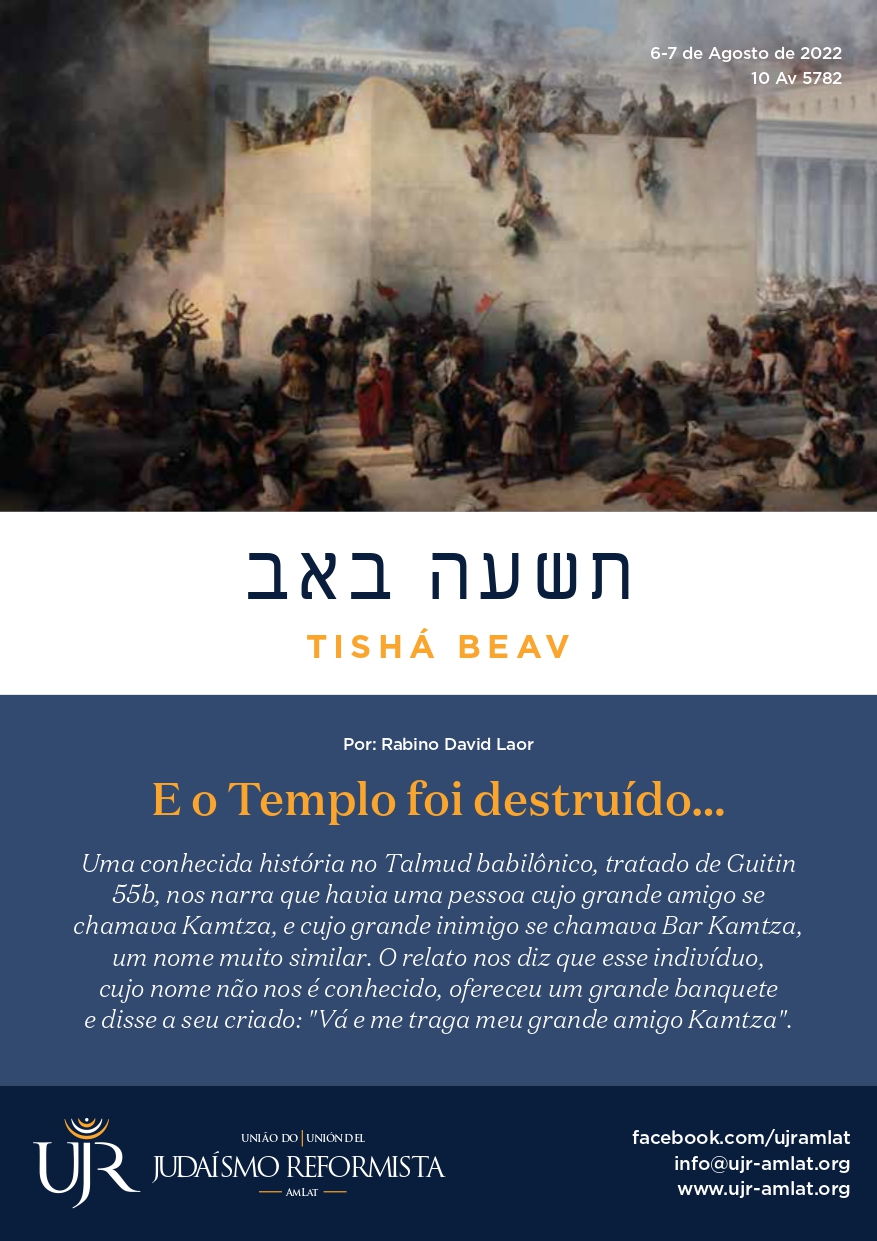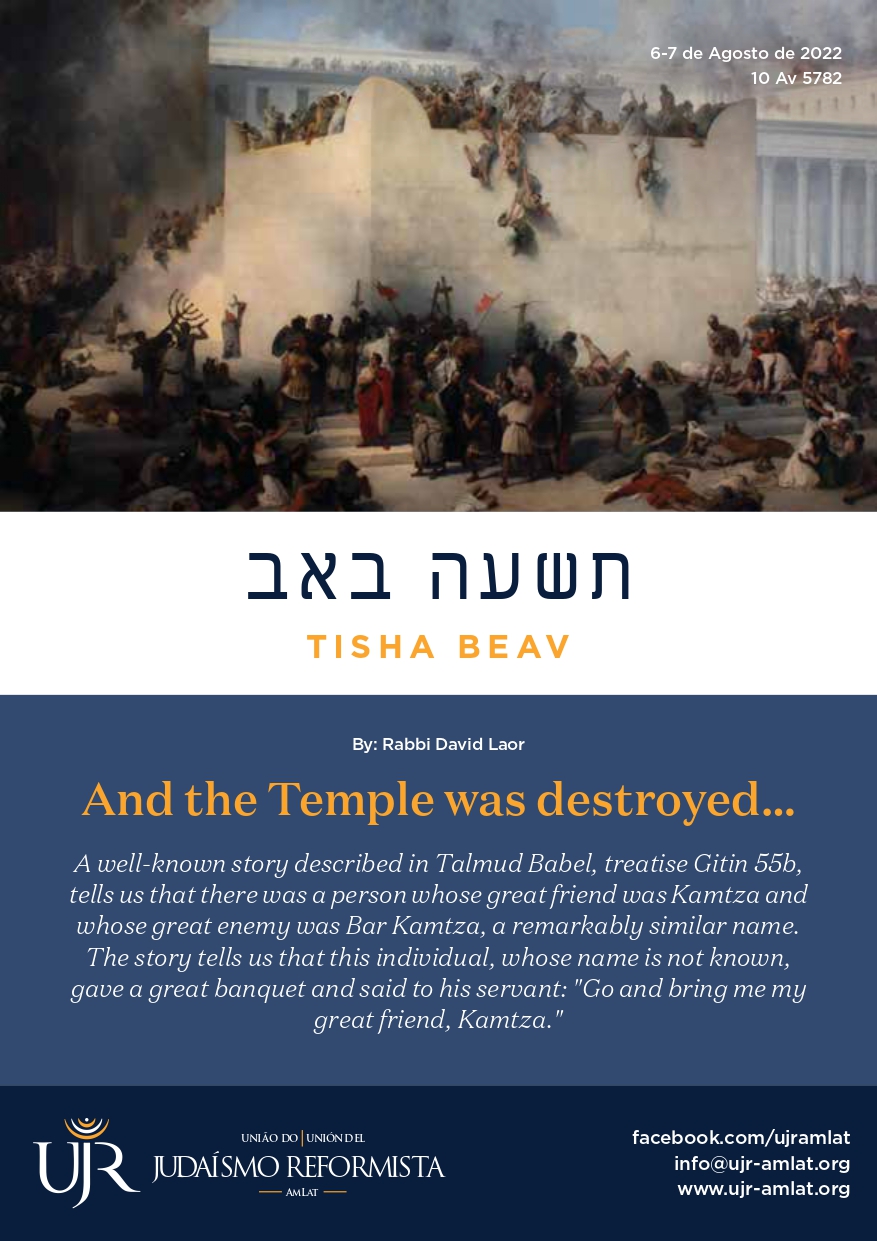תִּשְׁעָה בְּאָב
Tisha beAv
6-7 August 2022
10 Av 5782
And the Temple was destroyed…
A well-known story described in Talmud Babel, treatise Gitin 55b, tells us that there was a person whose great friend was Kamtza and whose great enemy was Bar Kamtza, a remarkably similar name. The story tells us that this individual, whose name is not known, gave a great banquet and said to his servant: “Go and bring me my great friend, Kamtza.”
The servant, who apparently did not pay attention to the name or was simply confused by such similar names, went and instead of inviting Kamtza, he mistakenly invited only his great enemy Bar Kamtza, who went at the banquet. The enigmatic man who organized the party, upon arriving at the hall, discovered that his great enemy Bar Kamtza was among the guests! Quite surprised to see that Bar Kamtza was at his banquet, this man who was now the host of the party said aloud that Bar Kamtza was forbidden to be among the guests. The Talmudic text relays the interesting dialogue between them:
Said the host before them all: “That man (pointing to Bar Kamtza) is this man’s baal devava (pointing to himself).” The expression used, baal devava, is extraordinarily strong and is not only understood as “enemy”, but as “hated one”. And turning to Bar Kamtza said aloud: “So what are you doing here? Get up and go!” Bar Kamtza, who was invited, albeit by mistake, to the banquet, was certainly more surprised than the host, and calmly replied: ”I am already here, please allow me to stay and I will pay for whatever I eat and drink. Just don’t embarrass me by throwing me out.”
The host, perhaps taking the opportunity to really embarrass his enemy, or simply out of anger, shouted, “No! You must go now!” Bar Kamtza, probably embarrassed by the situation and trying to smooth things over, replied, “I’m willing to pay for half of the party’s costs, but please don’t embarrass me and don’t kick me out.” The host insisted to everyone’s amazement and said, “No! You must go now!” As a last resort to maintain his honor, Bar Kamtza pleaded, “I’m willing to pay the expenses for the entire party! But please do not chase me or humiliate me in front of everyone, let me stay…” The host, blinded by courage, and in front of everyone shouted: “No! you must go now!”
Everyone in the room was silent, and no one said or did anything. Given the tense situation between the two, and seeing that Bar Kamtza did not move from his chair, the host finally decided to take Bar Kamtza by the arm, forcefully lift him up, and escort him out of the banquet…
Probably because of the great humiliation he had felt, Bar Kamtza said to himself, “What hurts me the most is that the wise rabbis who were sitting there did not protest or do anything about the actions of the host. And although they witnessed how I was humiliated by him, I realized that they were happy and satisfied with what the host did! Now, due to this, I will tell the Emperor!”
The next day, Bar Kamtza reported to the Emperor: “The Jews have rebelled against you.” The emperor, surprised by the statement, asked, “Who said it is so?” to which Bar Kamtza replied, “Go and test them. Send them an offering in honor of the government and see if they sacrifice it.” The emperor sent a special three-year-old calf through Bar Kamtza. But as Bar Kamtza came with the calf to the temple, he stained the calf’s upper lip. Some say he made the stain on his eyelids, a place where, according to the law, it is a stain, but according to the Gentiles for their offerings, it was not a stain. Therefore, when Bar Kamtza brought the animal to the Temple, the priests did not sacrifice it on the altar because it was stained, but neither could they explain this to the gentile authorities, who did not consider it stained.
Despite the stain, the sages considered sacrificing the animal as an offering, for it came from the emperor, thus keeping the peace with the government. Rabbi Zecharya ben Avkolas said to them, “But if the priests sacrifice him, people will say that spotted animals can be sacrificed as offerings on the altar!” Thus, the rabbis declared: “But if we do not sacrifice the animal, we must prevent Bar Kamtza from telling the emperor.” Therefore, the sages even thought of murdering Bar Kamtza so that he would not speak against them to the emperor. Again, Rabbi Zecharya told them, “No! Because if they kill Bar Kamtza, people will say that whoever stains the animals to be slaughtered must be killed!”
Given the complexity of the situation, the sages simply decided to do nothing! Just like at the feast of the unknown host. The Roman authorities accepted Bar Kamtza’s slander and consequently, the war between Jews and Romans began, and in the end… the Temple was destroyed… How much teaching can we learn from this interesting story! And yet, after 1952 years since the destruction of the temple, I wonder, have we really learned anything?
Earlier last month, on Rosh Chodesh Tamuz, and as it happens every month, dozens of Haredi protesters tried to disrupt Rosh Chodesh’s monthly service of “Neshot HaKotel – The Women of the Wall.” This has been the case month after month for years, and there would be nothing to be surprised about. This month, however, hostility extended to the egalitarian section of the Kotel open to liberal groups, “Ezrat Israel”, where an American family’s Bar Mitzvah celebration was taking place. Joel Mann, the father of Seth Mann, who was celebrating his Bar Mitzvah that day, described what happened, a condemnable event that echoes the story of Kamtza and Bar Kamtza: “Get out! You must go now!” they shouted to this family, as they held up signs in Hebrew that Mr. Mann did not understand. He then asked them what was the reason for their aggression. The answer to his question shocked him. The Haredim told him that “they were not Jews.”
Joel says: “I tried to explain to them that my son was becoming bar mitzvah, but they wouldn’t accept anything. They continued to harass us. They tried to approach our group, but our family members formed a semicircle around my son as he chanted the Torah and protected him from these hooligans who were trying to attack us.”
And the police? Well, like the sages in our story… they did little or nothing to stop the riots and violent attacks that took place. They just stood there watching the vandals attacking people whose only desire was to pray and beg for Shalom. “The Israeli police just stood there, in the same silence, while Haredi teenagers attacked Jews,” declared painfully Mr Joel Mann.
So, I wonder, have we really learned our lesson? This attack on non-Orthodox Jews at the holiest site in all of Judaism is terrifying and dangerous. We should be alarmed that these young Haredi Jewish teenagers feel religiously justified to attack other Jews who read the Torah and celebrate their Bar Mitzvah. Perhaps we should be even more alarmed by the failure of the police to protect non-Orthodox Jews from such attacks. These humiliating and shameful actions, and especially the silence of the authorities, are sure to have long-term consequences. First, for those who dreamed of coming to Israel to celebrate these important milestones at the Kotel… and most importantly, for us to remember the end of the story and be alert! Because with such hatred, we can endanger our national homeland, “And the temple be destroyed…”, God forbid!
The second Temple was destroyed by Sinat Chinam, a natural hatred between brothers… may the Eternal hear our prayers in this coming Tisha BeAv, let us pray that this hatred between us will disappear, and let us all act so that we can live together, in the words of the Psalm: Shevet Achim Gam Yachad, together as brothers, Amen.
Rabbi David Laor
Comunidad B’nei Israel
Costa Rica
—





